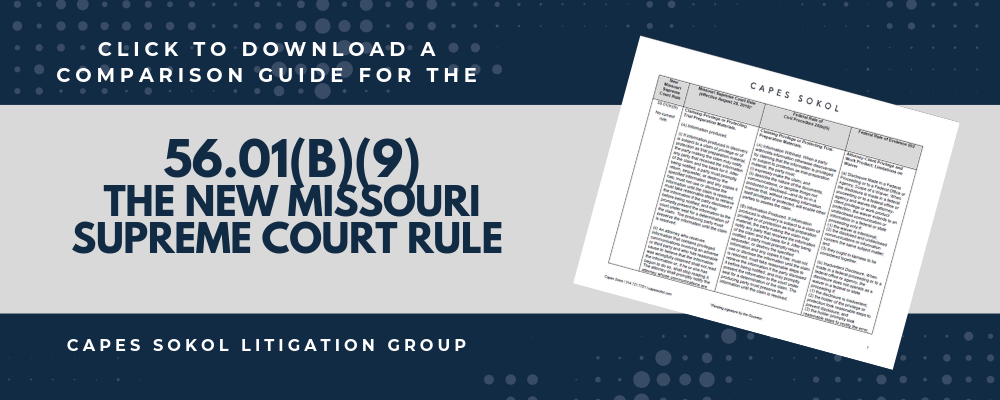Resources
Firm Insights
Significant Changes Coming to Missouri Trial Practice: Claw Back Procedures
Last week, Capes Sokol’s Litigation Group discussed legislation recently passed by the Missouri Legislature that is designed to bring the Missouri Supreme Court Rules more closely aligned with the Federal Rules of Civil Procedure (“FRCP”).
Today we want to examine the proposed addition of Rule 56.01(b)(9), which would for the first time provide a procedure for clawing back attorney-client privileged or attorney work product materials (“Protected Information”) that have been produced in the course of discovery.
Significant Changes Coming to Missouri Trial Practice Series
Missouri Supreme Court Rule 56.01
Rule 56.01(b)(9) would mirror FRCP 26(b)(5)(A)-(B):
A party making a claim that Protected Information has been produced may notify the receiving party and the basis for the claim. The receiving party must promptly return, sequester, or destroy the Protected Information; may not use the Protected Information until the claim is resolved; must take reasonable steps to retrieve the Protected Information if the receiving party disclosed it before being notified; and may promptly present the information to the court under seal for a determination of the claim.
Drawing from Federal Rule of Evidence 502(b), the new Rule 56.01(b)(9) would provide that “[t]he production of privileged or work-product protected documents, electronically stored information or other information whether inadvertent or otherwise, is not a waiver of the privilege or protection from discovery in the proceeding.”
Unlike FRE 502(b), Rule 56.01(b)(9) would not require the holder of the privilege or protection to have (1) taken reasonable steps to prevent disclosure and (2) promptly taken reasonable steps to rectify the error, including following FRCP 26(b)(5)(B), in order for the disclosure to not operate as a waiver in a federal or state proceeding.
The protection afforded by Rule 56.01(b)(9) would also appear to be limited in its protection to the current proceeding. However, FRE 502(c) does provide, in part, that a disclosure made in a state court proceeding that is not subject to a state-court order concerning wavier the disclosure does not operate as a waiver in a federal proceeding if the disclosure “is not a waiver under the law of the state where the disclosure occurred.”
Rule 56.01(b)(9) would be distinguishable from the corresponding federal provisions in that it would place affirmative and immediate responsibilities on an attorney who receives privileged information. Specifically, it would prohibit an attorney “who receives information that contains privileged communications involving an adverse or third party and who has reasonable cause to believe that the information was wrongfully obtained” from reading such information and require the receiving attorney to “promptly notify the attorney whose communications are contained in the information to return the information to the other lawyer and, if in electronic form, delete it and take reasonable measures to assure that the information is inaccessible.”
Implications on Missouri Litigation
According to its sponsor Senator Tony Luetkemeyer, Senate Bill 224 is designed to shorten discovery and make it more efficient, which will in turn reduce litigation costs to parties. Due to the exponential growth of ESI in litigation, parties need tools that enable them to produce ESI more efficiently and economically.
The addition of Rule 56.01(b)(9) would place parties in a better position to do so as it enables parties to reduce their costs in conducting privilege review and to produce documents sooner, while providing them an additional layer of protection should Protected Information be inadvertently produced. Should Senate Bill 224 be signed into law, parties should nonetheless consider whether a they should seek a stipulation or court order providing additional protections than those afforded by Rule 56.01(b)(9) in the event of a disclosure of Protected Information.
In the final installment of this series, Capes Sokol’s Litigation Group will analyze areas in which the Missouri Supreme Court Rules were not brought into alignment with the Federal Rules of Civil Procedure and the implications on Missouri trial practice.
Sorry, we couldn't find any posts. Please try a different search.
The choice of a lawyer is an important decision and should not be based solely upon advertisements.
Let's Work Together
If you have questions, we’re ready to help you find the answers.
Newsletter Sign-up
Join our mailing list and stay up to date with Capes Sokol!
By clicking the “Subscribe” button you
agree with our Terms and Conditions.
